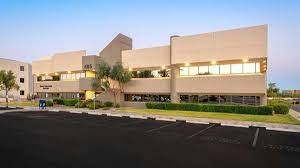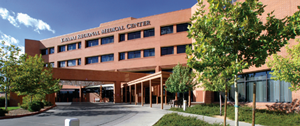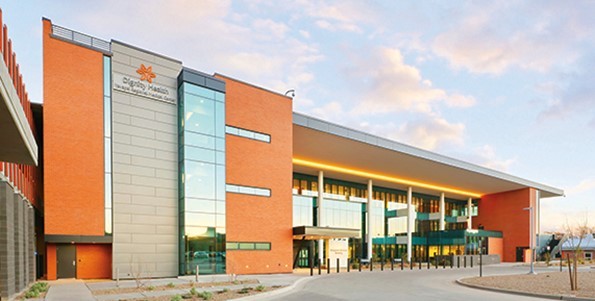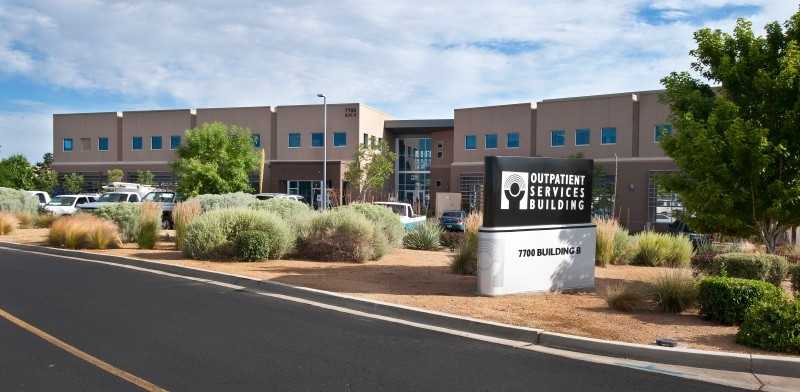Dignity Health Medical Group Cardiology – Mercy Gilbert
3420 S. Mercy Rd.
Suite 312
Gilbert, AZ 85297
Call (480) 728-6420
Know Your Heart's True Health. Take Our Free Assessment Now

When Minutes Matter: Our Emergency Heart Protocol.
Often, the first indication of heart disease is a heart attack. That's why Dignity Health's comprehensive heart care program springs into action the moment you arrive in our emergency room. We rapidly assess your condition and immediately initiate the necessary cardiac diagnostic services. In the event of a A ST-Elevation Myocardial Infarction (STEMI), a severe type of heart attack where a coronary artery is completely blocked, causing significant damage to the heart muscle, you will be quickly transferred to our state-of-the-art cardiac cath lab for an angioplasty, where blocked arteries are opened using a small balloon.
Our commitment to prompt, life-saving care aligns with the American College of Cardiology and American Heart Association's recommendation of a 'door-to-balloon' time of less than 90 minutes.
For too long, heart disease has been mistakenly perceived as primarily a man's issue. However, the reality is stark: heart disease is the leading cause of death for women in the U.S., surpassing all forms of cancer. Tragically, more women die from heart disease each year than men.
Historically, the symptoms of heart disease have been largely defined by male experiences, leading to a critical issue: women are more likely to dismiss or overlook the symptoms they do experience. This delay in seeking care can have severe consequences.
While the typical warning signs of a heart attack can include pressure or squeezing in the chest, pain in one or both arms, or shortness of breath, women often experience these differently or present with more subtle symptoms such as:
At Dignity Health, we understand that women's heart health demands a specialized and attentive approach. Our dedicated team of cardiologists and care professionals partner with you to proactively manage and prevent heart disease. We focus on addressing your unique concerns and identifying specific warning signs, ensuring early diagnosis and personalized treatment that truly reflects your needs.

Cardiovascular imaging is used to evaluate and aid in diagnosing cardiac issues or concerns. Care providers frequently request diagnostic testing to gather more information about specific cardiac or vascular disease symptoms. Main types of cardiac imaging:
If you're experiencing symptoms like a fluttering sensation, a heart that beats too fast or slow, dizziness, or shortness of breath, these could be signs of an irregular heart rhythm (arrhythmia). Your doctor may refer you to a cardiac electrophysiologist – a highly specialized heart doctor focused on your heart's electrical system.
At Dignity Health, our expert cardiac electrophysiology specialists are dedicated to diagnosing and treating a wide range of heart rhythm issues. By focusing on your heart's electrical activity, we aim to reduce your symptoms, improve your quality of life, and lower your risk of complications like blood clots. These advanced treatments even hold the potential to permanently resolve complex rhythm problems like atrial fibrillation (AFib). Our comprehensive Electrophysiology services include:
Cardiac rehabilitation is a proven, evidence-based practice that has been shown to improve outcomes for cardiac patients by teaching positive health choices. Cardiac Rehabilitation Program can help support recovery, reduce risk for further cardiovascular disease, and increase overall health and well-being.
If you are at high-risk for or have been diagnosed with heart disease, it is important to take action to prevent future problems with your heart. Your cardiologist or primary care doctor can write and sign a referral to the Cardiac Rehabilitation Department.
Your vascular system—comprising your veins, arteries, and other blood vessels—is crucial for circulating blood throughout your body. Vascular disease occurs when these vessels become blocked, weakened, or damaged, impacting vital blood flow. Conditions can range from common concerns like spider veins to life-threatening issues such as blood clots, or chronic conditions that require ongoing management.
At Dignity Health, our interventional cardiovascular team specializes in diagnosing and treating a wide spectrum of venous and arterial diseases. Whether conditions appear acutely or develop chronically over many years, our experts are equipped to provide the comprehensive care needed to restore and maintain your vascular health.
Interventional procedures are minimally invasive, catheter-based treatment options for cardiology conditions throughout the body. That means, they do not require open surgery. Minimally invasive cardiology treatments have many benefits, including:
Atrial Fibrillation (AFib) is a serious and increasingly common heart rhythm disorder, affecting millions of Americans. By the end of this decade, the American Heart Association projects over 12 million individuals will live with AFib. This condition significantly raises the risk of severe complications, including blood clots, stroke, heart failure, and other cardiac issues. Timely and effective treatment is therefore critical for managing AFib and preventing these life-altering consequences.
Dignity Health is at the forefront of AFib treatment with Pulsed Field Ablation (PFA), an innovative alternative to traditional thermal ablation techniques.
What is Pulsed Field Ablation (PFA)?
PFA is an FDA-approved, minimally invasive procedure designed to treat AFib. Unlike conventional thermal ablation (which uses heat to alter heart tissue), PFA utilizes precise pulsed electrical fields. These fields are delivered through an ablation catheter to specifically interrupt the irregular electrical pathways in the heart that trigger AFib.
One of PFA's significant advantages lies in its precision. The pulsed electric fields efficiently isolate the pulmonary veins and surrounding structures – key areas involved in AFib – potentially reducing the risk of unintended impact on adjacent healthy tissues during the treatment. This advancement offers a new level of safety and effectiveness for patients seeking treatment for AFib.
At Dignity Health, we offer specialized programs and resources tailored to empower you in managing your heart health. Here's how we can help:
Personalized Assessment: Our expert cardiologists and care team will work closely with you to understand your individual heart disease risk profile, focusing on factors unique to women. Together, they'll help you and your physician create a personalized plan for prevention and improved heart health. Take the Heart Health Quiz
Recognizing Warning Signs: It's crucial to understand the early indicators of heart disease, especially those women may experience differently. The Dignity Health Cardiologists will guide you on how to recognize these vital warning signs so you can seek timely care. Discover How to Identify Heart Disease Symptoms
Lifestyle & Wellness Planning: Beyond medical treatment, our team provides comprehensive guidance on lifestyle modifications. They'll help you navigate diet, exercise routines, stress management (including work and home pressures), and behavioral changes to foster long-term heart wellness. Explore Tips for a Heart-Healthy Lifestyle
Medication Management & Support: Dignity Health will provide expert advice on medications, ensuring they are optimized for your specific needs. Our focus is on supporting you, in collaboration with your primary physician, as you work towards your wellness goals for a healthier heart and body.
When facing heart trouble, a variety of advanced treatments are available to help restore your heart’s function and alleviate symptoms. Our team of renowned cardiologists at Dignity Health provides the full spectrum of cardiovascular treatments in Arizona, from minimally invasive procedures to complex open-heart surgeries. We are proud to be a nationally recognized leader in cardiovascular care, serving our community through our facilities distinguished by top industry awards including St. Joseph’s Hospital and Medical Center, Chandler Regional, and Mercy Gilbert Medical Centers.
Our cardiologists recommend cardiovascular treatments to correct a wide range of heart conditions, effectively reduce symptoms, and significantly improve your quality of life.
Common Cardiovascular Procedures We Offer:

When someone experiences a medical emergency involving their heart, understanding the critical difference between a heart attack and cardiac arrest is vital, especially concerning CPR.
Heart Attack vs. Cardiac Arrest: What's the Difference?
Why is CPR Critical During Cardiac Arrest?
If a heart attack leads to cardiac arrest, the heart stops pumping blood, meaning the brain and other vital organs are immediately deprived of oxygen. Brain cells begin to die within minutes. This is where CPR becomes a true lifesaver:
Quality heart care should be convenient. Explore our network of Dignity Health facilities across Arizona, bringing expert heart specialists and comprehensive services closer to you. Find the location that best meets your needs.

3420 S. Mercy Rd.
Suite 312
Gilbert, AZ 85297
Call (480) 728-6420

3420 S Mercy Road
Suite 300
Gilbert, AZ 85297
Call (480) 728-6420

1727 W. Frye Road,
Suite 200
Chandler, AZ 85224
Call (480) 728-5960

485 S. Dobson Road
Suite 203
Chandler, AZ 85248
Call (480) 728-2690

3200 South Alma School Road
Suite 204
Chandler, AZ 85248
Call (480) 728-5500

500 W Thomas Road
Suite 850
Phoenix, AZ 95013
Call (602) 406-1150

1003 Willow Creek Road
Prescott, Arizona 86301
Call (928) 445-2700

1001 Willow Creek Road
Suite 2200
Prescott, AZ 86301
Call (928) 445-6025

7700 East Florentine Rd.
Building B, Suite 206
Prescott Valley, AZ 86314
Call (928) 442-8117